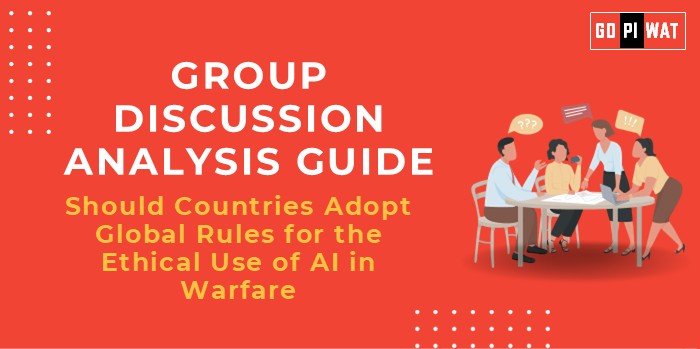📋 Group Discussion Analysis Guide
🤖 Should Countries Adopt Global Rules for the Ethical Use of AI in Warfare
🌐 Introduction to the Topic
📖 Opening Context: The rise of artificial intelligence (AI) has transformed warfare, raising ethical, legal, and humanitarian concerns. Global regulations for the ethical use of AI in military applications are crucial to maintaining international peace and security.
📜 Topic Background: The advent of AI in warfare includes autonomous weapons, surveillance systems, and cyber defense tools. While these advancements enhance efficiency and strategic capability, they pose ethical dilemmas such as accountability, bias in algorithms, and risks of escalation. The UN and other global forums are actively debating frameworks to regulate these technologies.
📊 Quick Facts and Key Statistics
- 💵 Global Defense Spending on AI: Estimated at $18.82 billion in 2024, reflecting AI’s critical role in modern militaries.
- 🤖 Autonomous Weapons Systems Deployment: Over 30 countries reported testing or deploying autonomous systems in 2023.
- 📝 UN Resolution on AI in Warfare: 85 nations endorsed initial guidelines on lethal autonomous weapons in 2023.
- ⚠️ Incidents of AI Malfunction: 12% of autonomous systems demonstrated unpredictable behaviors in 2022, raising safety concerns.
🌍 Stakeholders and Their Roles
- 🏛️ Governments: Develop, deploy, and regulate AI-based systems for defense and ensure adherence to international laws.
- 🌐 International Organizations: Bodies like the UN advocate for global standards and monitor compliance.
- 💻 Technology Companies: Innovate and supply AI solutions, holding responsibility for ethical design and transparency.
- 👥 Civil Society: Push for accountability and highlight humanitarian implications of autonomous weapons.
🏆 Achievements and Challenges
🌟 Achievements:
- ✔️ Enhanced precision in military operations, reducing collateral damage.
- 💻 AI’s role in cybersecurity, preventing large-scale cyberattacks.
- 🌐 International discussions such as the 2023 Geneva Conventions update to include AI ethics.
⚠️ Challenges:
- ❓ Ethical dilemmas about decision-making in life-and-death situations.
- 🛑 Lack of a unified global framework, with nations prioritizing national security.
- 🔒 Vulnerabilities to hacking and algorithmic biases.
🌍 Global Comparisons:
- 🇳🇴 Success: Norway implemented strict guidelines for AI in defense, emphasizing human oversight.
- 🇺🇸 Challenges: The US faced criticism for limited transparency in AI weapon testing.
📚 Case Studies:
- 🇺🇦 The use of AI in Ukraine’s defense demonstrated its strategic potential but raised questions about ethical boundaries.
✨ Structured Arguments for Discussion
- 💬 Supporting Stance: “Global rules ensure accountability and prevent misuse of AI, fostering trust among nations.”
- ⚖️ Opposing Stance: “Sovereign states must prioritize national security; global rules may hinder innovation.”
- 🔄 Balanced Perspective: “While sovereignty is crucial, a baseline of global ethical standards can prevent escalations and unintended consequences.”
🎯 Effective Discussion Approaches
📖 Opening Approaches:
- “AI’s role in modern warfare isn’t just a technological shift but an ethical challenge.”
- “Global cooperation on AI ethics mirrors efforts like the Geneva Conventions for modern warfare.”
🔄 Counter-Argument Handling:
- ✔️ “Acknowledging sovereignty concerns, collaborative research hubs can balance innovation and ethical compliance.”
📈 Strategic Analysis of Strengths and Weaknesses
- 💪 Strengths: Technological superiority, precision.
- ⚠️ Weaknesses: Algorithmic biases, limited human oversight.
- 💡 Opportunities: Cross-border research initiatives, ethical AI frameworks.
- 🚨 Threats: Escalations due to AI errors, proliferation risks.
📚 Connecting with B-School Applications
- 🌟 Real-World Applications: Exploring the intersection of AI, ethics, and policy for research in operations and international management.
- 💬 Sample Interview Questions:
- “How can AI be ethically integrated into national defense strategies?”
- “What role do businesses play in ensuring ethical AI deployment in warfare?”
- 📖 Insights for Students:
- Focus on the balance between innovation and ethical responsibility, critical for leadership roles.


